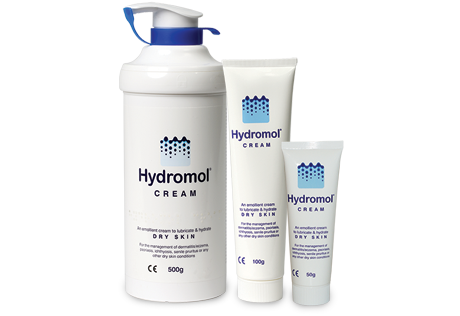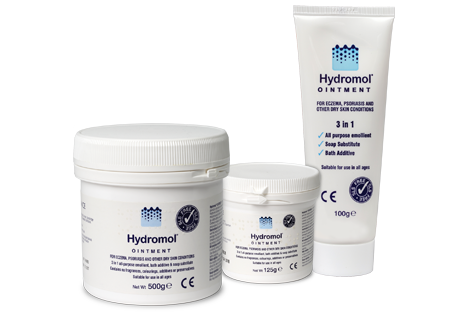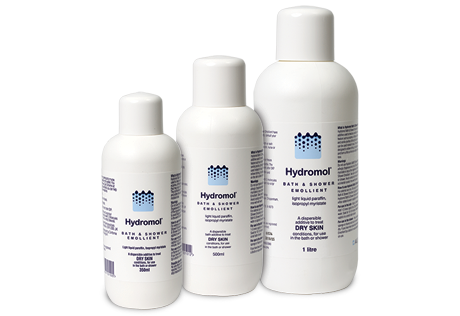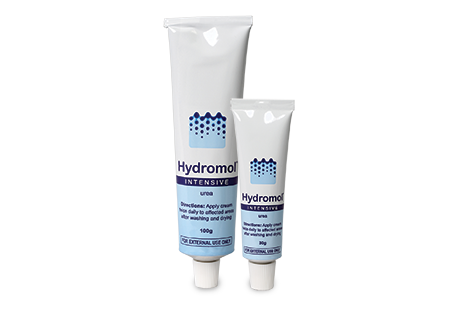
Fiona, a Dermatology Nurse Consultant, provides her top tips and answers your frequently asked questions.
It is important not to take too many baths or showers as this will dry out your skin, wash as necessary, but no more than once a day.
Put on your soap substitute prior to getting in the shower/bath and use as a soap.
Use warm water – not too hot – and try to be out as quickly as possible!
After a bath or shower pat your skin dry as when you rub your skin too hard it will make it very itchy and dry.
Don’t forget to put on your emollient and moisturiser nice and slowly when the skin is slightly damp.
Check out Hydromol Bath & Shower.
The most effective time to apply your moisturiser is when the skin is slightly damp as this will help to seal in moisture.
You can find more tips and advice on how best to apply Hydromol here.
The best clothing to wear are those made from cotton or silk.
Buying a pre-payment certificate to get your prescriptions can make your treatment more affordable.
You can ask the chemist or go onto the NHS website for prepayment certificates.
Eczema can make your skin feel very itchy.
Scratching it may make it even worse. Not only that, but it can also make the skin infected.
Instead, try patting your skin.
Bacteria can hide under your nails, remember to keep them short and smooth.
You can find tips on how to break the itch/scratch cycle here.
Your hands have a lot of bacteria sitting around, you may not see it, but it is there.
Before you put on your emollient or ointment, make sure you wash your hands first.
You can find more tips and advice on how best to apply Hydromol here.
Have you heard of that important saying, “your body needs water”?
Well, it is very important. Your skin cells need to be full of water to help make a super strong skin barrier.
This helps keep bacteria out and water in. In eczema or other dry skin conditions there is not enough water in these cells to do this, so try to drink plenty of water throughout the day.
You can find more information on how to break the itch/scratch cycle here.
If your emollient or ointment makes your skin better, it is very important to keep applying it to your skin every day to prevent the risk of flare ups.
You can check the Hydromol range by clicking here.
Emollients create a nice layer on the top of the skin which keeps it nice and cool…
It keeps those nasty bacteria out and keeps water in.
Sweat and clothes rubbing can make Hydromol come off throughout the day so reapply as much as possible and never let your skin get dry.
You can find more tips and advice on how best to apply Hydromol here.
In some cases, GP’s may be reluctant to prescribe emollients, or may reduce a current prescription. This is due to a number of issues in which the British Association of Dermatologists, and the Dermatology Council for England have been working for over a year to resolve.
While this is still ongoing, if you are experiencing problems obtaining emollients, or other items related to your diagnosis on prescription from your GP you can find support from ISG (Ichthyosis Support Group) at: https://www.ichthyosis.org.uk/Pages/FAQs/Category/prescribing-issues where you can access downloads of a prescribing letter and referral pad to aid in getting your emollients prescribed.
Ichthyosis is a rare skin disease that usually affects the whole body. Most types are present at birth and inherited, meaning they may run in families as a result from genetic changes. There is no cure for ichthyosis currently, however symptoms can be managed.
For support with ichthyosis, you can access the Ichthyosis Support Group website here: https://www.ichthyosis.org.uk/
NEXT SECTION
About Eczema
Find out more about skin and eczema.
NEXT SECTION
What is Eczema
Find out more about the different types of eczema
NEXT SECTION
Living with Eczema
Discover hints & tips to help manage your condition on a daily basis
NEXT SECTION
Treatment Options
Find out more about the different treatment options available.
NEXT SECTION
Parents & Carers
Find out more about how to support your child with their eczema.
NEXT SECTION
Woundcare
Find out more about how emollients can support in the care of vulnerable skin.
NEXT SECTION
The Living with Eczema App
Find out more and how to download.
NEXT SECTION
Useful Links
Check out useful links to help you with your condition.
NEXT SECTION
About Eczema
Find out more about skin and eczema.
NEXT SECTION
What is Eczema
Find out more about the different types of eczema
NEXT SECTION
Living with Eczema
Discover hints & tips to help manage your condition on a daily basis
NEXT SECTION
Treatment Options
Find out more about the different treatment options available.
NEXT SECTION
Parents & Carers
Find out more about how to support your child with their eczema.
NEXT SECTION
Woundcare
Find out more about how emollients can support in the care of vulnerable skin.
NEXT SECTION
The Living with Eczema App
Find out more and how to download.
NEXT SECTION
Useful Links
Check out useful links to help you with your condition.
1. National Eczema Society. Topical Calcineurin Inhibitors (TCIs). https://eczema.org/information-and-advice/treatments-for-eczema/topical-calcineurin-inhibitors/. Accessed April 2023.




